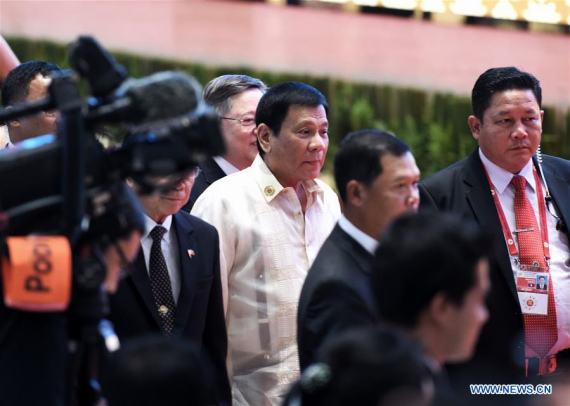
Philippine President Rodrigo Duterte (C) arrives to attend the 11th East Asia Summit (EAS) in Vientiane, Laos, Sept. 8, 2016. (Photo: Xinhua/Qin Qing)
Philippine President Rodrigo Duterte said Tuesday that his country will no longer participate in joint patrols with the United States in the South China Sea, describing such patrols as "a hostile act."
On Monday, Duterte said that U.S. special forces in southern Philippines should leave.
Such decisions and remarks by Duterte showed signs of subtle changes in the relationship between Manila and Washington.
Duterte's spat and confrontation with the U.S. began from the recently-concluded Association of Southeast Asian Nations (ASEAN) summit.
On Sept. 5, Duterte said before flying to Laos to attend the summit that he is a leader of a sovereign country and is answerable only to the Filipino people.
He was answering a reporter's question about how he intends to explain the extrajudicial killings to U.S. President Barack Obama. More than 2,000 suspected drug pushers and users have been killed since Duterte launched a war on drugs after taking office on June 30.
"I do not have any master except the Filipino people, nobody but nobody. You must be respectful. Do not just throw questions. Putang ina, I will swear at you in that forum," Duterte said, using the Tagalog phrase for "son of a bitch."
Duterte expressed regret over the remarks the next day, but the damage was done. His expletives against Obama prompted the latter to cancel their bilateral meeting on the sidelines of the ASEAN meeting.
In the same gathering during the East Asian Summit, Duterte veered away from the prepared speech and instead talked about the massacre perpetrated by the American forces against Filipino Muslims in the southern province of Sulu in 1906, which he described as human rights violation.
Furthermore on Tuesday, Duterte abandoned the hidden rule that the Philippines always buys weaponry from the North Atlantic Treaty Organization (NATO). Instead he announced that he was thinking of buying weapons from China and Russia, and would dispatch experts to the two countries for on-the-spot investigations.
Duterte's recent remarks illustrate the new Philippine president's intent to keep a distance from America in a bid to maintain balance between his country's relationships with the U.S and China.
According to analysts, the reason Duterte wishes to uphold an independent foreign policy is to avoid getting entangled in a possible U.S.-China confrontation, or even worse, being crushed in a conflict between the two giants.
Duterte believes being too close to the U.S. is as equally dangerous as being too close to China, analysts say. He aims to take the middle route between the two powers to avoid irritating both while reaping the benefits of a balanced relationship.
However, keeping a distance from its American ally doesn't necessarily entail conflict. The core interests between the Philippines and the U.S. remain.
The Philippines and the U.S. signed three vital defense treaties - the Mutual Defense Treaty in 1951, the Visiting Forces Agreement in 1999, and the Enhanced Defense Cooperation Agreement in 2014.
The Philippine foreign affairs ministry, defense ministry and armed forces have all recently reiterated the validity of the three pacts. Duterte himself also promised before his inauguration that the Philippines would continue to maintain the treaties.


















































